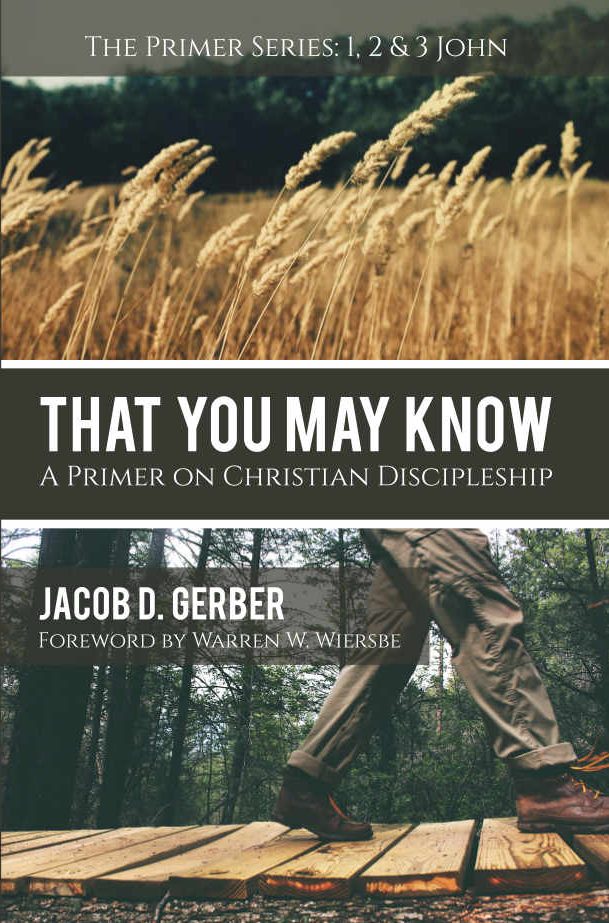Books

While there are many books written about Christian discipleship, there are not nearly enough books on discipleship that primarily expound the Bible itself. The Apostle John wrote three letters, however, with the main purpose of helping disciples to grow.
That You May Know: A Primer on Christian Discipleship is an enriching study that will lead you through John’s teaching on following Jesus as a disciple.
This book is more than a commentary and more than a topical book on the subject of Christian discipleship. Instead, this is a primer on Christian discipleship written as a careful reading of God’s word in 1, 2 & 3 John. It’s ideal for your own individual devotional reading or as a helpful resource for your group Bible study.
Download the First Two Chapters of That You May Know for Free
Bible Studies: Paul's Letter to the Philippians
Studies from my forthcoming pastoral commentary on Paul’s Letter to the Philippians, Have This Mind: A Primer on the Cruciform Life.
Access the complete set of Bible studies from Philippians here.
Bible Studies: The Gospel of John
Access the complete set of Bible studies from the Gospel of John here.
John 13:1–20: The Servanthood of Jesus
The suffering servanthood of Jesus connects to our own suffering: Jesus takes the form of a servant to save and to send. (Exposition of John 13:1–20)
John 12:27–50: The Glory of Jesus
What should detract from Jesus’ glory only glorifies him further. Jesus reveals his glory through the disgrace of the cross. (Exposition of John 12:27–50)
John 12:12–26: The Kingdom of Jesus
Jesus’ spiritual kingdom is invisible, hidden, and secret, confounding the world. Jesus is building a misunderstood kingdom. (Exposition of John 12:12–26)
John 11:45–12:11: The Preparation of Jesus
Both theologians of glory and theologians of the cross pursue the cross of Jesus, but for very different reasons. (Exposition of John 11:45–12:11)
John 11:1–44: The Life of Jesus
By raising Lazarus from the dead, Jesus demonstrates that he will shepherd us out of death and into his resurrection life. (Exposition of John 11:1–44)
John 10:22–42: The Works of Jesus
The works of Jesus corroborate, validate, and authenticate the word of Jesus. We need both his word and his works. (Exposition of John 10:22–42)
Bible Studies: The Book of Genesis
Access the complete set of Bible studies from Genesis here.
Genesis 35:1–29: The Conquest of Jacob
God brings the storylines of Jacob’s life to a close in order to open the next phase of his redemptive plan. God decreases Jacob in order to increase Israel. (Exposition of Genesis 35:1–29)
Genesis 34:1–31: The Passivity of Jacob
Leadership requires sacrificial responsibility. God will establish his kingdom without fail, whether by his appointed leaders or by zealous substitutes. (Exposition of Genesis 34:1–31)
Genesis 33:1–20: The Reconciliation of Jacob
As the reconciliation of Jacob and Esau demonstrates, God reconciles us to our brothers in order to restore us to himself. (Exposition of Genesis 33:1–20)
Genesis 32:22–32: The Struggle of Israel
When God wrestles with us—and even when he cripples us—he does not seek our harm, but our lasting good. God wrestles with us to remake us. (Exposition of Genesis 32:22–32)
Genesis 32:1–21: The Sacrifice of Jacob
In the moment of Jacob’s greatest weakness, he comes most closely to resemble his most illustrious Descendant. God sustains our faltering faith when we are in the shadow of death. (Exposition of Genesis 32:1–21)
Genesis 31:22–55: The Dispute of Jacob
When it seems that Laban will defeat Jacob, God intervenes to stop Laban from harming Jacob. God conquers the enemies of his people at the darkest hour. (Exposition of Genesis 31:22–55)
Bible Studies: Paul's First Letter to the Corinthians
Access the current set of Bible studies from 1 Corinthians here.
Bible Studies: The Letters of John
Access the complete set of Bible studies from the Letters of John here.
Bible Studies: The Gospel of Luke
Access a handful of Bible studies from the Gospel of Luke here. These were studies written during the Advent season of 2018. At the moment, I do not have plans to continue working through the Gospel of Luke; however, I wanted to make these few studies available online for whomever may benefit from them.
Bible Studies: The Book of Ecclesiastes
Access the complete set of Bible studies from the Book of Ecclesiastes here.
Bible Studies: The Gospel of Matthew
Matthew 24:15–35: The Coming of the Son of Man
The destruction of the temple in AD 70 was an earthly sign that Jesus Christ is reigning triumphant in heaven. (Exposition of Matthew 24:15–35)
Matthew 24:1–14: The Beginning of the Birth Pains
As Jesus prepares to go to the cross, he prepares his disciples for the suffering they must face. Persevere by the power of Christ. (Exposition of Matthew 24:1–14)
Matthew 23:25–39: Formalism and Hypocrisy
In the second half of his woes, Jesus rebukes the scribes and Pharisees for formalism and hypocrisy. Seek refuge under the shadow of Christ’s wing. (Exposition of Matthew 23:25–39)
Matthew 23:13–24: Neglecting Weightier Matters
The Pharisees tried to teach a religion that would make keeping the law easier, but only the gospel can lift the weight of the law. (Exposition of Matthew 23:13–24)
Matthew 23:1–12: Spiritual Leadership
As Jesus opens his denunciation against Israel’s spiritual leaders, he begins with a foundational principle: church leadership is spiritual leadership. (Exposition of Matthew 23:1–12)
Matthew 22:41–46: David’s Greater Son
After the religious leaders fail to embarrass Jesus with their questions, Jesus asks his own question to prove that he is David’s greater Son. (Exposition of Matthew 22:41–46)
Bible Studies: First Peter
Bible Studies: The Book of Acts
Acts 4:1–22: No Other Name
The early church has an important lesson to impart: because there is no salvation outside of Christ, Christians can suffer boldly. (Exposition of Acts 4:1–22)
Acts 3:11–26: Repent Therefore
To those who witnessed the lame man healed, Peter emphasizes the gospel: Repent by turning from your sin and toward your Savior. (Exposition of Acts 3:11–26)
Acts 3:1–10: “The Lame Shall Leap”
Although Old Testament sacrifices and money have no power to heal, Jesus our High Priest removes all barriers that keep us from God. (Exposition of Acts 3:1–10)
Acts 2:42–47: Bountiful Sowing and Reaping
Life in the early church illustrates an important principle about life in the church: whoever sows bountifully will reap bountifully. (Exposition of Acts 2:42–47)
Acts 2:37–41: The Promise of the Gospel
In the great response of the people to Peter’s Pentecost sermon, the promise of the gospel cancels the condemnation of the law. (Exposition of Acts 2:37–41)
Acts 2:14–36: The Reign of the King
In his Pentecost sermon, Peter connects the resurrection of Christ to the outpouring of the Holy Spirit. King Jesus reigns through his Holy Spirit. (Exposition of Acts 2:14–36)
























